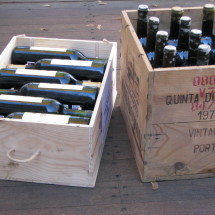Law Offices of John P. Connell, P.C.: In July 2014, the Massachusetts legislature amended M.G.L. c. 138, § 19F in its entirety, and created a new type of license known as a “Direct Wine Shipper License,” that authorizes wineries holding such a license to sell and ship up to 12 cases of their wine a year per consumer directly to Massachusetts consumers. On November 21, 2014, the Massachusetts Alcoholic Beverages Control Commission (“ABCC”) provided guidance on the new law in an Advisory that states, “[i]n order to qualify for a Direct Wine Shipper License, a person, firm, or corporation must: (1) hold a federal basic permit; (2) hold a license issued in the Commonwealth or any other state to manufacture wine; (3) hold a license in any other state to export wine; and (4) be in the business or manufacturing, bottling or rectifying wine.” Any winery meeting these qualifications is eligible to apply for a Direct Wine Shipper License, subject of course to other standard licensing conditions and prohibitions. The new law does not apply, however, to wineries located outside of the United States because foreign wineries typically do not obtain a “federal basic permit.” This new law takes effect on January 1, 2015 and significantly amends the current version of §19F.
The new version of §19F and the current version of §19F are significantly different in that under the current version of §19F, wineries producing more than 30,000 gallons of wine a year, or so-called “Large Wineries,” could only obtain this license to ship directly to consumers if they had not shipped wine into Massachusetts through a wholesaler in the preceding six months, which pretty much excluded all well known wineries in the United States. Wineries, (including hard cider manufacturers), however, that produced less than 30,000 gallons a year, or so-called “Small Wineries,” could ship wine (and cider) under this current version of §19F directly to: (1) consumers; (2) retail establishments such as restaurants and liquor stores; and (3) wholesalers.
In other words, Small Wineries, which included just about all wineries and cider houses located in Massachusetts, enjoyed a significant business advantage over “Large Wineries” in that they could “self distribute” to the entire market (wholesalers, retailers and consumers) just as those Massachusetts breweries that possess a “farmer brewer” license are entitled to do pursuant to §19C. Indeed, it remains an anomaly under state law that Massachusetts “farmer brewers” can distribute directly to restaurants and liquor stores but Massachusetts “farmer wineries” cannot pursuant to §19B unless they acquired the additional current version of §19F’s direct shipping license.
Under the new version of §19F, however, no wineries, whether they be “Large Wineries” or “Small Wineries,” will be allowed to sell directly to retail establishments after January 1, 2015. Rather, under the new version of §19F, all wineries (including cider houses) may only sell directly to consumers under this “direct shippers” license. While this new version of §19F is arguably a victory for consumers and “Large Wineries,” many “Small Wineries” built a business model based upon on self distribution, including many Massachusetts manufacturers, and now that business is no longer available to them. Massachusetts retail liquor stores are also now at an economic disadvantage in that consumers can now order their favorite wine directly from large out-of-state wineries rather than incur the retail markup imposed by their local liquor store, but with the cost of shipment now added to the product only time will tell whether it makes more sense for a consumer to order direct from the winery or from their local liquor store.
Interestingly, while the legislature had the opportunity to amend §19B, the “farmer winery” license which prohibits self distribution to retail establishments, when it amended §19F, which has now deprived Massachusetts “farmer wineries” of the ability to sell directly to retail establishments, the Massachusetts legislature chose not to amend §19B. Whether the legislature intended to disadvantage Massachusetts wineries and cider houses at the expense of the wholesaler industry, or whether creating a “pure” direct shipment license to benefit Massachusetts consumers caused this unintended consequence to befall Massachusetts wineries, is not known but it should be rectified in the next legislative Session.
Contributed by Leslie A. Buckler
© Law Offices of John P. Connell, P.C., 2014.

